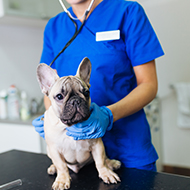
Major veterinary organisations in the UK have criticised the reported extreme breeding.
UK veterinary and animal welfare organisations are concerned over the state of extreme breeding in the UK after a litter of hairless French bulldogs has reportedly been bred in Scotland.
The brachycephalic crossbreed dogs are thought to be the first 'hairless French bulldogs' in the UK, and are believed to be the result of crosses between French bulldogs, pugs and Chinese crested dogs.
Brachycephalic (flat-faced) dogs, have become increasingly more popular and trendy over the last few years. However, these dogs can suffer 'serious and life-limiting' health and welfare problems, as the BVA details in its policy on brachycephalic dogs.
These issues include anatomical defects of the upper airway, causing breathing difficulties, eye disease, inability to mate or give birth naturally, repeated skin infections and dental problems.
Alongside this, the new litter of hairless brachycephalic crossbreeds may find it difficult to keep warm, and have an increased risk of sunburn and other skin problems.
A number of UK veterinary and animal welfare organisations have commented on the reported litter, unanimously demonstrating concern for their welfare, and denouncing the extreme conformation.
'Totally unacceptable' - RVC
Dr Dan O’Neill, associate professor of companion animals epidemiology at the Royal Veterinary College (RVC) said: “The RVC recognises that issues related to extreme conformation as one of the greatest welfare challenges for dogs.
“The RVC VetCompass Programme is a leading source of robust evidence to help veterinarians, owners and breeders to understand the true scale and welfare impact of extreme conformations in dogs. VetCompass has already generated over 20 peer-reviewed publications highlighting the range of welfare issues currently affecting French Bulldogs.
“Adding additional extreme features such as hairlessness to these already compromised dogs is likely to lead to even further health and welfare issues for this breed and should be considered totally unacceptable under any circumstances.”
'A real concern' – The Kennel Club
Bill Lambert, health, welfare and breeder services executive at The Kennel Club and founding member of the Brachycephalic Working Group, commented: “This reported litter of dogs is a real concern.
“Breeding which focuses on what people see as ‘novel’, ‘glamourous’ or ‘rare’ features can mean the most important factors – like health, welfare and temperament – have been forgotten or overlooked, by both potential owners and unscrupulous breeders, cashing in on a ‘trend’.
“In particular, with some brachycephalic breeds which have surged in popularity to their detriment of their health and welfare, using extreme features to sound appealing or as a marketing tool is simply unacceptable.”
'Potential owners must stop and think' – Brachycephalic Working Group
“The UK Brachycephalic Working Group (BWG) is really concerned about the move towards increasingly extreme exaggerations in flat-faced dogs, like French bulldogs and pugs,” commented Dr Dan O’Neill, chairman of the BWG.
“This report of ‘hairless French bulldogs’ and development of a new flat-faced ‘breed’ is another example of harmful extreme conformation, which comes amongst others like ‘teacup dogs’ or ‘exotic’ or ‘rope nose bullies’.
“The bottom line here is that it is simply unacceptable. In fact, breeding, marketing and selling dogs with intentionally harmful and greater extremes is both against the law, and seriously worsening the already existing health crisis for flat-faced dogs.
“For the sake of the nation’s dogs, potential owners must stop and think – avoid being inadvertently sucked in by advertising to purchase an extreme type of dog – and we urge breeders to always and absolutely prioritise health and welfare."
'Profession has a real responsibility' - BVA
BVA president Justine Shotton commented on the role of vets in combatting extreme breeding: “Reports that a litter of hairless French bulldog crosses has been bred in the UK are extremely concerning.
"As a profession, we have a real responsibility to say that whilst we care deeply for each existing animal, unscrupulous breeding for ‘novelty’ looks without thought to animal welfare is not okay.
“We would encourage vets to continue to share pre-purchase advice with clients and to recommend the use of the Puppy Contract to ensure they are getting a healthy and well-socialised puppy from a responsible source.”



 The latest
The latest